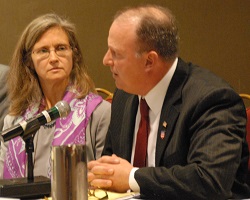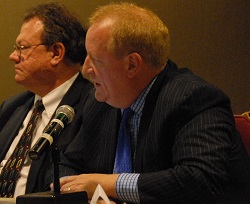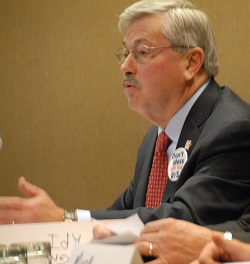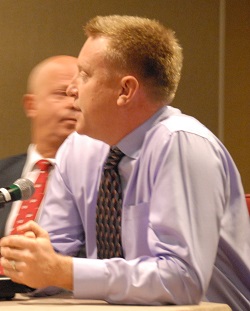 The Environmental Protection Agency (EPA hearing yesterday drew more than a hundred people from across the country that spoke on behalf of the Renewable Fuel Standard (RFS). There is alarm among the biofuels and agricultural industry with EPA’s proposed RFS rule to lower the renewable fuel volumes in 2014 from 2013. These volumes are even lower when compared to the volume ramp up as outlined in statute.
The Environmental Protection Agency (EPA hearing yesterday drew more than a hundred people from across the country that spoke on behalf of the Renewable Fuel Standard (RFS). There is alarm among the biofuels and agricultural industry with EPA’s proposed RFS rule to lower the renewable fuel volumes in 2014 from 2013. These volumes are even lower when compared to the volume ramp up as outlined in statute.
Here are just several of the comments made to the EPA yesterday.
POET DMS’s Business Development Manager Kevin Potas message to the EPA: “The cellulosic biofuels industry needs stable policy and a firm base of grain ethanol production in order to reach its potential. The low-hanging fruit of cellulosic biofuel production is the existing network of corn ethanol producers and their access to plentiful crop residue. When you weaken that industry, you weaken the opportunity for cellulosic ethanol expansion.”
Rick Hansen, a cattle feeder and crop farmer from Hinton, Iowa, told the EPA: “I could stand up here and tell you that the co-products from ethanol plants have been great for our business, and that for the first time I see a renewed optimism from the Midwest cattle feeder. Or I could mention how for the first time in decades farmers are making a living without the help from government farm programs. Or I could tout the number of young farmers and cattle feeders returning to their home place to follow their dreams and make a living. These are just a few of the reasons why an Iowa cattleman like me loves ethanol and the RFS, and there’s many more.”
Mark Wigans, a livestock producer from Renwick, Iowa, told the EPA: “Livestock producers in the Midwest have embraced distillers grains as a favored feed ingredient. Customers of mine who buy calves from our ranch, and feed them out, depend on a reliable consistent supply of distillers co-products for their business success. The Iowa ethanol plant near me sells over 500 tons of dried distillers products every day into local feed markets. Those hog and layer operations in the area won’t allow a ton of them to be shipped elsewhere, as they know the value of them in their feed rations and buy all they can get their hands on.”
Growth Energy’s Director of Regulatory Affairs, Chris Bliley testified: “The RFS was approved by a bipartisan majority in Congress and enacted into law nearly six years ago….oil industry has used its considerable power to delay, litigate, and undercut the RFS. The program was designed to spur investment in renewable fuels, not to punish those who have invested while rewarding those who have impeded development.”
 Randy Olson, executive director of the Iowa Biodiesel Board told the EPA: “I’m proud to say that our members are shining examples of what this policy was intended to create. I’m here to ask that you reconsider the proposed rule for Biomass-based diesel and Advanced Biofuels for 2014. Quite simply, the 1.28 Billion gallon Biomass-based diesel target as proposed will likely mean a reduction in biodiesel volumes for 2014 versus this year’s production, and, importantly, signal to a growing industry that the hurdles to compete with entrenched petroleum interests are even higher than we previously thought.”
Randy Olson, executive director of the Iowa Biodiesel Board told the EPA: “I’m proud to say that our members are shining examples of what this policy was intended to create. I’m here to ask that you reconsider the proposed rule for Biomass-based diesel and Advanced Biofuels for 2014. Quite simply, the 1.28 Billion gallon Biomass-based diesel target as proposed will likely mean a reduction in biodiesel volumes for 2014 versus this year’s production, and, importantly, signal to a growing industry that the hurdles to compete with entrenched petroleum interests are even higher than we previously thought.”
Jeff Johannesmyer, president and general manager of Western Iowa Energy in Wall Lake testified: “In a town of 850 people, our plant provides 30 well-paying jobs, and supports over 100 indirect jobs. Our community needs it. Also, based on clear policy signals from the Administration, since 2011 Western Iowa Energy has invested over $2 million to upgrade infrastructure and increase our process efficiency.”
 A few years ago, the U.S. was considered the most promising biofuels market in the world. But recent policy changes, including the latest from the Environmental Protection Agency (EPA) to roll back ethanol and biodiesel blend amounts to lower than what was scheduled in the Renewable Fuel Standard, is allowing the American biofuels market to be outpaced by competitors in Asia and South America. In addition, Thomas Corle with DONG Energy told the panel at yesterday’s hearing on the subject in Arlington, Va. that investors are now more nervous to put money into the U.S. system.
A few years ago, the U.S. was considered the most promising biofuels market in the world. But recent policy changes, including the latest from the Environmental Protection Agency (EPA) to roll back ethanol and biodiesel blend amounts to lower than what was scheduled in the Renewable Fuel Standard, is allowing the American biofuels market to be outpaced by competitors in Asia and South America. In addition, Thomas Corle with DONG Energy told the panel at yesterday’s hearing on the subject in Arlington, Va. that investors are now more nervous to put money into the U.S. system.










